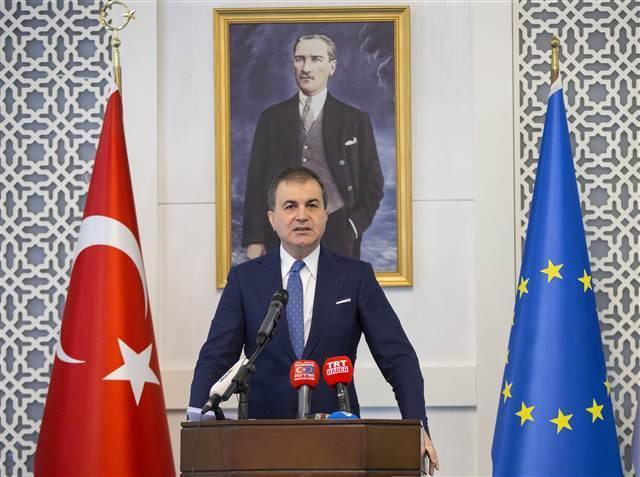
The EU’s annual progress report on Turkey does not present fair and objective criticism, Turkey’s EU Affairs Minister Ömer Çelik has said, criticizing the bloc for not making profound criticisms that could improve relations.
“The report is far from encouraging closer relations between Turkey and the EU… We are not afraid of criticism, but this approach lacks fairness,” Çelik told reporters on April 18.
Çelik said he would write a letter to the European Commission because the report notes the EU will not open any negotiation chapters, stressing that it is contradictory to a migrant deal between Ankara and Brussels.
Çelik said Turkey continues the state of emergency, extended for a seventh time recently, because they still felt threat posed by the Fetullahist Terrorist Organization (FETÖ), which Turkey accuses of infiltrating several state institutions.
The minister said the report portrayed FETÖ “as an innocent nongovernmental organization.”
Speaking about the report’s criticism toward Turkey’s presidential system, Çelik said the report disrespected the Turkish nation and the decision it made in the April 2017 referendum.
Turkey’s Foreign Ministry on April 17 said the EU “is unwilling to understand the difficulties” Turkey is facing.
“Turkey is simultaneously fighting against several terrorist organizations, particularly the PKK [Kurdistan Workers’ Party], ISIL [Islamic State of Iraq and the Levant] and FETÖ [Fethullahist Terror Organization]. In this respect, we think that not mentioning in the report the threat from FETÖ that cowardly attacked our state, parliament and people is a critical deficiency,” it said in a statement.
The ministry also slammed the EU for support it showed to Greece amid escalating tension with Turkey.
“The Kardak islet and their territorial waters and airspace are exclusively under Turkish sovereignty. The support given as ‘carte blanche’ by the EU to member states in their disputes with third countries do not contribute to the resolution of those issues within the framework of good neighborly relations and international law. Such a stance also contradicts the EU’s own values,” it added.
“Operation Olive Branch, referred to in the Enlargement Strategy Paper, is a counter-terrorism operation aimed at eliminating the terror threat against Turkey and on the basis of the right to self-defense. It has set an example on how to combat terrorism without harming civilians. For the success in the fight against terrorism, the international community as a whole, including the EU, has to be consistent vis-a-vis terrorism and refrain from making distinctions among terrorist organizations,” said the ministry.
“It is wrong for the European Commission to have made a distinction between Turkey and the ‘Western Balkans’ in the Enlargement Strategy Document,” the statement said.
“Creating such artificial distinctions between candidate countries is an example of the discrimination we have been subjected to in our accession process,” it said.
The ministry touched on the European Commission’s “objective and constructive stance” concerning the visa liberalization dialogue and the update of the Customs Union between Turkey and the EU, inviting other relevant institutions of the EU to channel their efforts toward finalizing these issues.
“In sum, the report is far from understanding the realities of Turkey and thus far from serving its purpose. In addition, it places the unfair interests of its obvious members before a universal concept such as the rule of law and thus negates the EU’s own values. Despite all the negativity in the EU’s approach, EU membership continues to remain our strategic priority,” said the ministry.